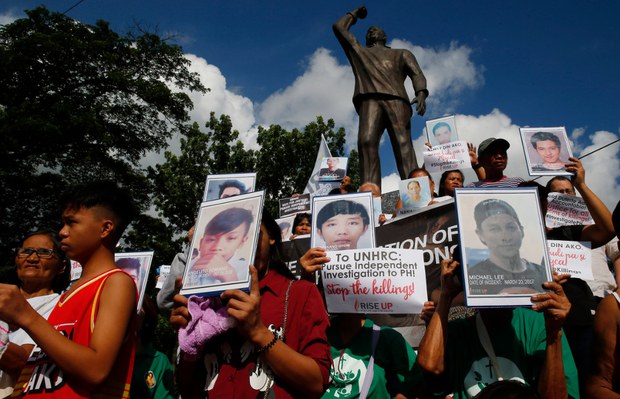Philippine President Blisters Iceland for Pushing UN Probe into Drug War
2019.07.12
Manila
 Survivors of people killed in Philippine President Rodrigo Duterte’s war on drugs hold pictures of their loved ones during a rally in Manila, July 9, 2019.
Survivors of people killed in Philippine President Rodrigo Duterte’s war on drugs hold pictures of their loved ones during a rally in Manila, July 9, 2019.
Philippine President Rodrigo Duterte on Friday skewered Reykjavik for pushing a U.N. resolution to investigate his administration’s bloody war on illegal drugs, by saying that Icelanders “just go about eating ice” and suggesting they are not exposed to crime.
The United Nations Human Rights Council voted narrowly Thursday to approve the resolution introduced by Iceland and that calls for the U.N. High Commissioner for Human Rights to probe thousands of extrajudicial killings in the Philippine drug war and produce a report on it by June 2020.
Speaking to jail management staff in Manila on Friday, Duterte said people in Iceland did not understand the problems in his country.
“You have too much ice and there is no clear day or night there,” he said. “So you can understand why there is no crime, there are no police either and they just go about eating ice.
“These stupid (people), they don’t understand the social, economic, political problems of the Philippines.”
The U.N. resolution was spurred by concerns that Filipino police may have taken shortcuts and committed abuses in the drug war that was launched after Duterte took power in 2016. Latest figures from the national police show that 6,600 suspected dealers and addicts have died in encounters in the past three years, while rights groups claim that many thousands more have been killed by vigilantes linked to police.
Duterte spokesman and legal counsel Salvador Panelo said the Philippines condemned the resolution.
“We question the propriety of the resolution as well as its validity. The subject resolution not only was not unanimously adopted, but it didn’t even get a simple majority of the 47 countries,” he said.
The resolution passed by a vote of 18 to 14 with 15 abstentions.
“A simple majority would have been 24. This means that majority of the members are not really convinced of the resolution calling for the investigation of the so-called extra-judicial killings in our country,” Panelo said.
Panelo said the Icelandic government was led astray by false news reported by a few biased media members he did not name, while calling the resolution “grotesquely one-sided, outrageously narrow and maliciously partisan.
“It reeks of nauseating politics completely devoid of respect for the sovereignty of our country even as it is bereft of the gruesome realities of the drug menace in the country,” he said.
The resolution insulted the majority of Filipinos who supported the raids, he added.
“In any case, President Rodrigo Roa Duterte has already spoken. He will be reviewing the intent of the proposed investigation and will decide thereafter on whether to permit the same to proceed or not,” Panelo said.
“Should it proceed impartially, we are certain that its result will only lead to the humiliation of the investigators, as well as of Iceland and the 17 other nations supporting it, since there never has been – nor will there ever be – state-sponsored killings in this part of the world. The Duterte presidency is not cowed or weakened by such a resolution,” he said.
Rights groups, advocates welcome probe
Elsewhere in the Philippines, victims’ survivors and rights groups welcomed the investigation.
“Right now we do not want the situation to escalate further,” National Council of Churches spokesman Mervin Toquero told reporters at a press conference, according to Reuters.
“We hope that the resolution to conduct ‘impartial investigations and to hold perpetrators accountable in accordance with international norms and standards, including due process and the rule of law,’ will rebound to justice, and an end to, or at the very least, a lessening of the climate of impunity in the country,” he said.
Independent rights investigators have tried to get access to the Philippines for the past three years, but have been blocked by Duterte who went so far as to warn International Criminal Court (ICC) members that they risked being arrested if they carried out an investigation here.
Apart from the U.N. resolution, Duterte also faces two separate murder cases before the ICC filed by two former alleged henchmen and relatives of victims of his drug war.
On Friday, Sen. Leila del Lima, a former rights commissioner and Duterte political rival who is in jail for what she claims are false charges related to drug trafficking, said the government was normalizing deaths carried out in the name of the drug war.
She said the president had emboldened state actors to carry out the killings, promising them of protection from prosecution.
“Killing is not normal, but Duterte is normalizing it as a state policy,” de Lima said in a statement. “We should resist it. We should be outraged that the highest official of the land is boasting of his killing adventure in the past and even now.”







